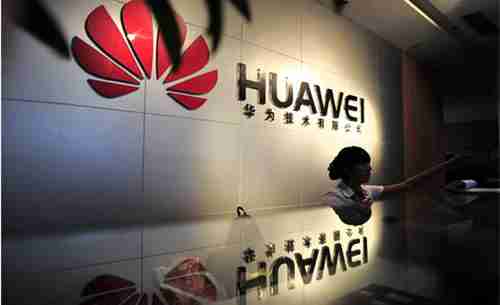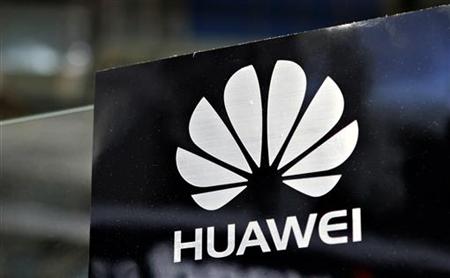This morning’s key headlines from GenerationalDynamics.com
- Defense Secretary Panetta warns of ‘Cyberwar Pearl Harbor’
- House Intelligence Committee warns against doing business with Huawei and ZTE
- China continues economic warfare against Japan over Senkaku islands
Defense Secretary Panetta warns of ‘Cyberwar Pearl Harbor’

Huawei office in Wuhan, China
In a speech on Friday, Secretary of Defense Leon Panetta describeddescribed the dangers of cyberwar. His remarks were timely, comingjust after the House Intelligence Committee issued a report warning ofpotential cyberattacks through devices sold by the Chinese companiesHuawei and ZTE. Panetta said:
“These attacks mark a significant escalation of thecyber threat and they have renewed concerns about still moredestructive scenarios that could unfold.
For example, we know that foreign cyber actors are probingAmerica’s critical infrastructure networks. They are targeting thecomputer control systems that operate chemical, electricity andwater plants and those that guide transportation throughout thiscountry.
We know of specific instances where intruders have successfullygained access to these control systems.
We also know that they are seeking to create advanced tools toattack these systems and cause panic and destruction and even theloss of life.
Let me explain how this could unfold. An aggressor nation orextremist group could use these kinds of cyber tools to gaincontrol of critical switches. They could, for example, derailpassenger trains or even more dangerous, derail trains loaded withlethal chemicals.
They could contaminate the water supply in major cities orshutdown the power grid across large parts of the country.
The most destructive scenarios involve cyber actors launchingseveral attacks on our critical infrastructure at one time, incombination with a physical attack on our country. Attackerscould also seek to disable or degrade critical military systemsand communication networks.
The collective result of these kinds of attacks could be a cyberPearl Harbor; an attack that would cause physical destruction andthe loss of life. In fact, it would paralyze and shock the nationand create a new, profound sense of vulnerability.
As director of the CIA and now Secretary of Defense, I haveunderstood that cyber attacks are every bit as real as the morewell-known threats like terrorism, nuclear weapons proliferationand the turmoil that we see in the Middle East.”
It’s pretty clear that Panetta was referring to an attack by China. Chinais thought to have some 3,000 long-range missiles, many of them nuclearweapons targeted at American cities, has developed missiles specificallydesigned to target American aircraft carriers, and has been conducting cyberwarat the business espionage level for years. Panetta is saying that a full-scaleattack is coming, and that when it comes it will paralyze the nation.
His phrase “create a new, profound sense of vulnerability” might be an allusionto the words of Carl von Clausewitz in his 1832 book “On War,” in which hedescribes what happens to the initial war euphoria of a country when it suffersits first defeat:
“The effect of defeat outside the army — on thepeople and on the government — is a sudden collapse of thewildest expectations, and total destruction of self-confidence.The destruction of these feelings creates a vacuum, and thatvacuum gets filled by a fear that grows corrosively, leading tototal paralysis. It’s a blow to the whole nervous system of thelosing side, as if caused by an electric charge. This effect mayappear to a greater or lesser degree, but it’s never completelymissing. Then, instead of rushing to repair the misfortune with aspirit of determination, everyone fears that his efforts will befutile; or he does nothing, leaving everything toFate.”
In other words, it’s like the reaction to 9/11 a million times over.Dept. of Defense and Carl von Clausewitz
House Intelligence Committee warns against doing business with Huawei and ZTE
On Monday, the House Intelligence Committee issued a report warninggovernment agencies and private companies of the substantial risks ofdoing business with Chinese companies Huawei [pronounced WAH way]Technologies Company and ZTE Corporation because of their links to theChinese Communist Party and the People’s Liberation Army (PLA). Aftera year long investigation, the committee said that Huawei and ZTEprovided incomplete, contradictory, and evasive responses to theCommittee’s core concerns. According to the report:
“Despite hours of interviews, extensive and repeateddocument requests, a review of open-source information, and anopen hearing with witnesses from both companies, the Committeeremains unsatisfied with the level of cooperation and candorprovided by each company. Neither company was willing to providesufficient evidence to ameliorate the Committee’sconcerns. Neither company was forthcoming with detailedinformation about its formal relationships or regulatoryinteraction with Chinese authorities. Neither company providedspecific details about the precise role of each company’s ChineseCommunist Party Committee. Furthermore, neither company provideddetailed information about its operations in the UnitedStates. Huawei, in particular, failed to provide thoroughinformation about its corporate structure, history, ownership,operations, financial arrangements, or management. Mostimportantly, neither company provided sufficient internaldocumentation or other evidence to support the limited answersthey did provide to Committee investigators.
During the investigation, the Committee received information fromindustry experts and current and former Huawei employeessuggesting that Huawei, in particular, may be violating UnitedStates laws. These allegations describe a company that has notfollowed United States legal obligations or internationalstandards of business behavior. The Committee will be referringthese allegations to Executive Branch agencies for further review,including possible investigation.”
Huawei and ZTE’s primary business is selling high-end computernetworking switches and other equipment used by cell phone carriers,Internet service providers, and other companies to run communicationsnetworks. American companies like Cisco sell similar equipment, but theChinese versions are much cheaper, supposedly because of cheaper laborin China. There are Huawei and ZTE equipment used in internet switchesand phone switches around the world. The fear is that the Chinese haveinstalled “backdoor” capabilities into this equipment so that, at theappropriate times, the PLA could send out commands over the internet tellingthese devices to spy or to shut down, or to cause the kind of disastersthat Panetta outlined in his “Cyberwar Pearl Harbor” warning.
I’d now like to address a comment to those morons who claim that thisidea is so fantastical that it could never be done, or that if it wasdone it would be easily detected through extensive testing of thesedevices, such as what is already being done on a regular basis.
Anyone who, like myself, has spent part of his career developingchip-level operating system software for embedded systems can tell youthat not only is this doable, it’s not even particularly difficult forsomeone with the right skills. A backdoor capability would not bedetected by testing because it would be designed not to do anythinguntil a particular encrypted command was sent to it to enable it. Thebackdoor capability could be hidden so deeply in the chip structure ofa device that even other programmers working on the same project wouldnot be aware of it. And of course the company managers might not evenbe aware of it, especially the president of the American division ofthe Chinese company.
Now, having said that can be done easily, there’s no doubt that it HASbeen done. The PLA has been preparing for war with the U.S. in everypossible way, as I’ve been writing about for years. In addition tothe forces I’ve already described, China is has stationed militaryforces in the South China Sea, taking possession of islands thatbelong to other countries; they’ve declare economic warfare againstJapan for the same reason; they have thousands of missiles ready tolaunch against Taiwan; they have large military deployments in westernTibet ready to invade India; and they’ve demonstrated a capability todestroy American communications and GPS satellites.
What would be absolutely fantastical is to think that after China hasmade all these war preparations in other areas, the Chinese haven’tbothered to do the easiest thing of all: Implement backdoors ininternet and phone switches, and subsidize the equipment so that itcan be sold cheaply and in high volume to companies and governmentsaround the world. One can be absolutely certain that this hashappened. House Intelligence Committee and Technology Review
China continues economic warfare against Japan over Senkaku islands
For years, people have been telling me that the predictions of warby Generational Dynamics are certainly wrong because businessmen would preventthese wars from occurring and harming their businesses. This was always amoronic argument, but the conflict between China over theSenkaku/Diayou islands emphasizes what really happens. China’s levelsof nationalism and xenophobia towards the Japanese have reachedastronomical levels. Even the businessmen are highly nationalistic,and believe (or are forced to believe) that it’s their patrioticduty to give some business for the good of the country. Thus,China has been conducting an economic war against Japan: Japanesecar sales in China re in free fall; Japanese speakers in China arebooed or threatened; Chinese tourists in droves are canceling tripsto Japan; China’s government has encouraged riots to smash Japanesecars, Japanese businesses and Japanese manufacturing plants in China.
Contrary to the naive criticisms that have been leveled at me andGenerational Dynamics over the years, wars are not prevented becausethey’re bad for business. To the contrary, business ties are used aseconomic warfare, usually in preparation for military warfare.AP
Permanent web link to this article
Receive daily World View columns by e-mail

COMMENTS
Please let us know if you're having issues with commenting.